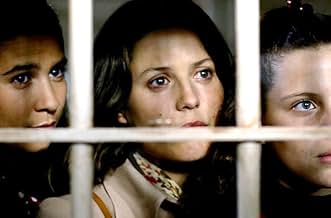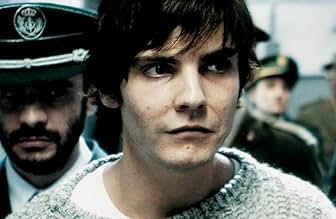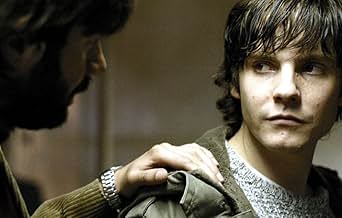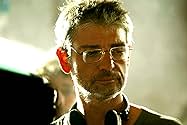VALUTAZIONE IMDb
7,2/10
3516
LA TUA VALUTAZIONE
Aggiungi una trama nella tua linguaA profile of anarchist and bank-robber Salvador Puig Antich, whose 1974 execution under the dictatorship of Francisco Franco ushered in a period of unrest that helped Spain transition to dem... Leggi tuttoA profile of anarchist and bank-robber Salvador Puig Antich, whose 1974 execution under the dictatorship of Francisco Franco ushered in a period of unrest that helped Spain transition to democracy.A profile of anarchist and bank-robber Salvador Puig Antich, whose 1974 execution under the dictatorship of Francisco Franco ushered in a period of unrest that helped Spain transition to democracy.
- Regia
- Sceneggiatura
- Star
- Premi
- 16 vittorie e 22 candidature totali
Biel Duran
- José Luis
- (as Biel Durán)
Recensioni in evidenza
i can't help wondering what the point of this film pamphlet was. it seemed to veer towards naive heroism in the beginning and at the end again, meanwhile completely neglecting a discussion of what set these people apart from other 'normal' terrorists. and then we get a subplot of the last death penalty dealt in Spain with this kid who of course doesn't deserve to be murdered at the hands of the state, but who does really. it fails on this level as well as a level of human relationship, using the story of the guard merely to make a point of how the revolution lives on.
so i felt really ambiguous and detached from the film, which seemed so uncommitted to an involved and deep discussion of its story.
so i felt really ambiguous and detached from the film, which seemed so uncommitted to an involved and deep discussion of its story.
I don't disagree with the view that the subject is quite appropriate for a movie but displays quite gruesome violence, almost senseless for an artistic product. The scenes leading to the execution of the sentence are particularly distressing are particularly lengthy, the sentence itself is really perturbing for such a kind of movie. Other than that the movie is supposed to accurately reflect the violent times around 1970 in the Western World, and hopefully does achieve that target. Have to admit that, however, good acting and good direction are displayed throughout the movie, the main weakness of the movie can be found in the script only.
Historical memory films often tread difficult ground, and Salvador (Puig Antich) does so with uncommon intensity. From the start, Manuel Huerga applies a powerful visual style that gives weight to the story of the Catalan anarchist executed by the Franco regime in 1974. The film doesn't hold back, throwing us directly into his inevitable fate, but before that, it presents Salvador as a human being-one with ideals, flaws, and a life that was taken away without mercy.
Daniel Brühl delivers an exceptional performance, portraying a character who feels alive even in the quietest moments. His evolution throughout the film is brutal, and when the final moments arrive, the anguish he conveys is difficult to shake off. Huerga's direction is another strong point, though the first section, centered on the heists, has a stylized approach reminiscent of Argentine cinema rather than raw realism. Fortunately, once the film shifts focus to the trial and the days leading up to the execution, everything becomes much more visceral, direct, and devastating.
One of the film's greatest achievements is how it avoids empty idealization or forced nostalgia. There are no one-dimensional heroes or villains here-just a story that hurts because it was real and still echoes today. The script masterfully builds tension, making every scene in the final stretch feel like a punch to the gut.
Despite some questionable aesthetic choices in the opening, Salvador is an incredibly powerful film. It doesn't just retell Puig Antich's story-it does so with a sensitivity and precision rarely seen in Spanish cinema. A sharp, unforgiving dose of reality that leaves its mark.
Daniel Brühl delivers an exceptional performance, portraying a character who feels alive even in the quietest moments. His evolution throughout the film is brutal, and when the final moments arrive, the anguish he conveys is difficult to shake off. Huerga's direction is another strong point, though the first section, centered on the heists, has a stylized approach reminiscent of Argentine cinema rather than raw realism. Fortunately, once the film shifts focus to the trial and the days leading up to the execution, everything becomes much more visceral, direct, and devastating.
One of the film's greatest achievements is how it avoids empty idealization or forced nostalgia. There are no one-dimensional heroes or villains here-just a story that hurts because it was real and still echoes today. The script masterfully builds tension, making every scene in the final stretch feel like a punch to the gut.
Despite some questionable aesthetic choices in the opening, Salvador is an incredibly powerful film. It doesn't just retell Puig Antich's story-it does so with a sensitivity and precision rarely seen in Spanish cinema. A sharp, unforgiving dose of reality that leaves its mark.
This movie is in fact two movies. The first one tells Salvador Puig Antich's life. Explains how he became involved in the resistance against Franco dictatorship and his beginnings in the criminal life. This way, the movie doesn't try to make him look like a saint, because he wasn't, and at the same time justifies him somehow, realistically showing the cruelty and repression that take place in the last years of Franco's life.
The other movie tells Salvador's last 12 hours. The relationship with his family, his friends and his enemies. And his cruel execution. This part is 100% Drama, and very well made one. Its almost 45 minutes of holding tears, jumping from a touching scene to a more touching one. Some of the weak points of the first part are finally justified to help this last devastating dramatization.
The main actors make a great job, specially Leonardo Sbaraglia, Daniel Brühl and Tristán Ulloa. Although the last one sounds a little too weird when he talks Catalan. The main problem of the movie is that the plot isn't thick enough. It tells a simple story of a simple boy and don't get to fully explore the characters minds. But it gets close.
The other movie tells Salvador's last 12 hours. The relationship with his family, his friends and his enemies. And his cruel execution. This part is 100% Drama, and very well made one. Its almost 45 minutes of holding tears, jumping from a touching scene to a more touching one. Some of the weak points of the first part are finally justified to help this last devastating dramatization.
The main actors make a great job, specially Leonardo Sbaraglia, Daniel Brühl and Tristán Ulloa. Although the last one sounds a little too weird when he talks Catalan. The main problem of the movie is that the plot isn't thick enough. It tells a simple story of a simple boy and don't get to fully explore the characters minds. But it gets close.
I've seen this film today, and although I wouldn't say it's great film wise, I think it's important for people to know about recent history, especially Spaniards. I'm totally against death penalty, and this film has only reassured me in the matter. But I must say the film is somehow partial, as Salvador was in fact a bank robber, no matter what he used the money for. The acting is quite impressive. I must confess I wasn't too convinced about Daniel playing Salvador, as he's German, but he's great. Tristán Ulloa is also very good, and he speaks really good Catalán, sounding native although he's actually Galician (north west Spain). And finally Leonardo Sbaraglia plays an impressive policeman. Incredibly, you forget he's an Argentinian sex symbol and does a really good Spanish accent.Also, I may be a bit impartial myself, since I know the sister of one of Salvador friends in the film and about the family suffer...
Lo sapevi?
- QuizManuel Huerga chose Daniel Brühl, whose mother is Spanish, to play Salvador because he didn't want to tell a Spanish story, but a universal drama. This was the first time Brühl filmed in Barcelona, his place of birth.
- Citazioni
Jesús: They've assassinated Carrero Blanco.
Salvador Puig Antich: That bomb killed me as well.
- ConnessioniEdited from Ogro (1979)
- Colonne sonoreI si canto trist
Written by Lluís Llach
Performed by Lluís Llach and Miquel Gil
Arranged by Borja Penalba
Produced by Borja Penalba and Xavi Puig
I più visti
Accedi per valutare e creare un elenco di titoli salvati per ottenere consigli personalizzati
- How long is Salvador (Puig Antich)?Powered by Alexa
Dettagli
Botteghino
- Lordo in tutto il mondo
- 3.445.943 USD
- Tempo di esecuzione
- 2h 14min(134 min)
- Colore
- Mix di suoni
- Proporzioni
- 2.35 : 1
Contribuisci a questa pagina
Suggerisci una modifica o aggiungi i contenuti mancanti

























